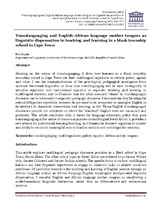Translanguaging and English-African language mother tongues as linguistic dispensation in teaching and learning in a black township school in Cape Town
Abstract
Drawing on the notion of translanguaging, I show how learners in a
Black township secondary school in Cape Town use their
multilingual repertoire to achieve power, agency and voice. I use
the conceptualisation of the prototypical pedagogical macrogenre
from systemic functional linguistics to show how translanguaging
can be used strategically to actualise regulative and instructional
registers to engender teaching and learning in multilingual
contexts, and to illustrate that the often-assumed “chaos” in
translanguaged discourse can be harnessed to engender
pedagogic discourse. I demonstrate that by using the extended
linguistic repertoire, learners do not need to be competent in
monoglot English to be involved in classroom interactions and
learning, as the Xhosa-English translanguaged discourses provide
the co(n)texts on which the “standard” English texts are
consumed and produced. The article concludes with a thesis for
language education policy that puts translanguaging at the centre
of classroom practice in multilingual South Africa: it provides a
new avenue for postcolonial learning/teaching, as it frames the
learners’ cognition of content and ability to construct meaningful
texts in familiar cultural and sociolinguistic contexts.

